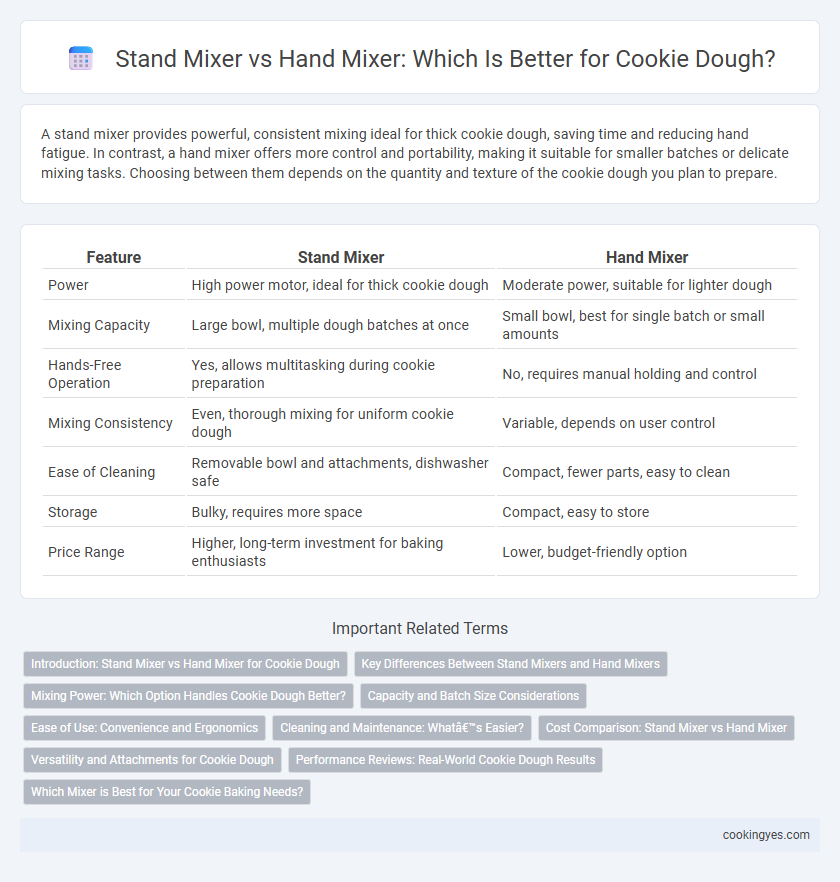A stand mixer provides powerful, consistent mixing ideal for thick cookie dough, saving time and reducing hand fatigue. In contrast, a hand mixer offers more control and portability, making it suitable for smaller batches or delicate mixing tasks. Choosing between them depends on the quantity and texture of the cookie dough you plan to prepare.
Table of Comparison
| Feature | Stand Mixer | Hand Mixer |
|---|---|---|
| Power | High power motor, ideal for thick cookie dough | Moderate power, suitable for lighter dough |
| Mixing Capacity | Large bowl, multiple dough batches at once | Small bowl, best for single batch or small amounts |
| Hands-Free Operation | Yes, allows multitasking during cookie preparation | No, requires manual holding and control |
| Mixing Consistency | Even, thorough mixing for uniform cookie dough | Variable, depends on user control |
| Ease of Cleaning | Removable bowl and attachments, dishwasher safe | Compact, fewer parts, easy to clean |
| Storage | Bulky, requires more space | Compact, easy to store |
| Price Range | Higher, long-term investment for baking enthusiasts | Lower, budget-friendly option |
Introduction: Stand Mixer vs Hand Mixer for Cookie Dough
Stand mixers deliver powerful, consistent mixing ideal for dense cookie dough, ensuring thorough ingredient incorporation with minimal effort. Hand mixers offer portability and ease of use, suitable for smaller batches or softer doughs but may struggle with heavy, thick mixtures. Choosing between the two depends on dough consistency, batch size, and user preference for control versus convenience.
Key Differences Between Stand Mixers and Hand Mixers
Stand mixers offer more power and stability, efficiently handling dense cookie dough with consistent mixing through planetary motion technology. Hand mixers provide greater maneuverability and are lightweight, suitable for smaller batches or softer doughs but may struggle with thick cookie dough. Stand mixers typically come with various attachments for versatile baking tasks, while hand mixers are limited to basic beaters, affecting their overall functionality in cookie preparation.
Mixing Power: Which Option Handles Cookie Dough Better?
Stand mixers typically offer higher wattage motors, usually ranging from 250 to 1000 watts, providing the robust power needed to handle thick cookie doughs without straining. Hand mixers generally have lower power, between 150 to 300 watts, making them less efficient for heavy, dense cookie doughs that require consistent and strong mixing force. Opting for a stand mixer ensures better dough development and uniform mixing, especially for recipes involving stiff or large batches of cookie dough.
Capacity and Batch Size Considerations
A stand mixer typically offers a larger capacity with bowls ranging from 4.5 to 7 quarts, making it ideal for mixing large batches of cookie dough efficiently. In contrast, hand mixers usually have limited power and smaller attachments, suitable for smaller batch sizes or when working with light doughs. Choosing between the two depends on the volume of cookie dough you plan to prepare regularly and the consistency required for proper ingredient incorporation.
Ease of Use: Convenience and Ergonomics
Stand mixers provide superior ease of use for cookie dough with hands-free operation and powerful motors that handle thick dough effortlessly, reducing user fatigue. Hand mixers offer greater convenience for small batches due to their lightweight, compact design and flexible maneuverability but require more manual effort and can strain wrists during prolonged use. Ergonomically, stand mixers minimize repetitive motions, whereas hand mixers demand careful grip to avoid discomfort during mixing.
Cleaning and Maintenance: What’s Easier?
A hand mixer offers easier cleaning and maintenance due to its compact size and detachable beaters that can be quickly rinsed or placed in a dishwasher. Stand mixers, while more powerful for heavy cookie dough, have larger bowls and attachments that require more thorough cleaning and drying to prevent buildup or rust. For frequent bakers prioritizing convenience, a hand mixer is typically the simpler and faster option to maintain.
Cost Comparison: Stand Mixer vs Hand Mixer
Stand mixers generally cost between $200 and $600, offering powerful motors and multiple attachments that justify the higher price for avid bakers. Hand mixers are more affordable, typically ranging from $20 to $100, but they provide less power and may struggle with dense cookie dough. Investing in a stand mixer can save time and effort in mixing thick doughs, while hand mixers remain a budget-friendly option for occasional baking.
Versatility and Attachments for Cookie Dough
Stand mixers offer greater versatility for cookie dough with powerful motors and a variety of attachments like dough hooks, beaters, and paddles tailored for mixing dense dough efficiently. Hand mixers, while more portable and easy to store, typically come with fewer attachments and less power, making them less suitable for heavy or large batches of cookie dough. Choosing a stand mixer enhances mixing consistency and saves time when preparing various cookie recipes requiring different textures and ingredient combinations.
Performance Reviews: Real-World Cookie Dough Results
Stand mixers consistently deliver superior performance for cookie dough, offering powerful motors and stable mixing with even ingredient incorporation, ideal for thick or large batches. Hand mixers perform adequately for small batches but often struggle with dense dough, leading to uneven mixing and longer preparation times in real-world baking tests. User reviews highlight stand mixers' efficiency and durability, making them the preferred choice for serious home bakers focused on consistent cookie texture and flavor.
Which Mixer is Best for Your Cookie Baking Needs?
A stand mixer with a powerful motor and dough hook attachment provides consistent mixing and kneading for thick cookie doughs, ensuring even texture and thorough ingredient incorporation. A hand mixer offers greater control and portability, ideal for lighter doughs and smaller batches, but may struggle with heavy, dense cookie doughs. Choose a stand mixer for frequent, large-scale baking, while a hand mixer suits occasional bakers and simpler cookie recipes.
Stand mixer vs Hand mixer for cookie dough Infographic

 cookingyes.com
cookingyes.com